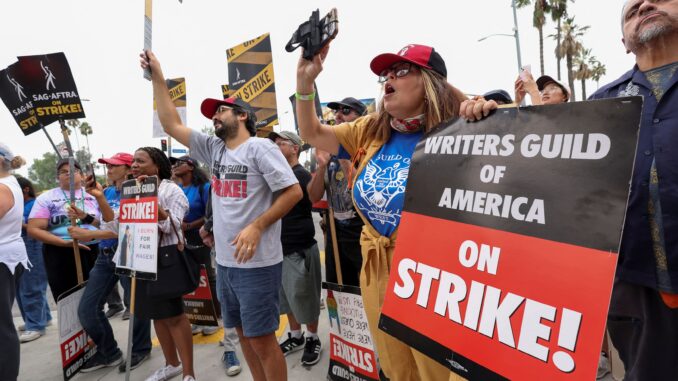
By Reima Choute (Reporting Assistance By Serin Sarsour)
About 160,000 people in the entertainment industry have been on strike since May 2, fighting for consistent pay and better treatment. The writers’ strike began when the Writers Guild of America (WGA), an alliance of two labor unions representing over 11,000 film, television, news, radio, and online writers, demanded higher pay, stable pay structure, and more fair deals and contracts.
Almost five months later, picketing has now been suspended after WGA and the Alliance of Motion Picture and Television Producers (AMPTP) reached a tentative agreement this past Sunday, Sept. 24. Numerous members of the Brooklyn College community stand with those who were on strike and are thrilled that there is finally a deal in the works.
“Fair compensation is at the heart of both the WGA and the SAG-AFTRA [Screen Actors Guild and the American Federation of Television and Radio Artists] strikes. The corporations just need to share the profits. That’s it,” said Patrick Sabongui, an actor and the head of the BFA Acting program at BC. “Enough of this greedy capitalism BS. You’ve got to keep the wheels greased to keep the machine running.”
The writers’ strike represents a pivotal moment in history, where the value of writers, actors, and all those in the entertainment industry is being acknowledged. While the strike has disrupted screens worldwide, it is also a catalyst for positive change, pushing for a future where creativity thrives, and writers receive the compensation they rightfully deserve. As the industry evolves, the voices advocating for fair compensation and treatment of the creative minds driving our favorite films and television series are growing stronger, and the hope is that this movement will pave the way for a brighter, more equitable future for all involved in the world of entertainment.
“As somebody who wants to work in TV eventually, I want to be able to do what I love and be comfortable. I don’t want to be starving and homeless while the person who decides if my show gets another season is making billions of dollars every year,” said Miad Abdelgadir, a senior at BC majoring in television, radio and emerging media.
Sabongui also stressed that writers are essential to the creation of any movie or television series, and their fair compensation is necessary to keep the industry afloat. Companies are not renewing TV shows for multiple seasons but are pumping out new content quicker than ever before. This places a lot of strain on the writers and makes it difficult for them to make a living. Many people, including current and aspiring workers in the entertainment industry, were tuning into the writers’ strike and recognized how the current state of the industry is impacting their everyday lives.
“This writers’ strike was long overdue. I think the work of writers, artists, actors, and creatives has been undervalued for far too long. In an industry – a profit-based industry that actually makes money – it’s unconscionable that the creative minds at the root of every creative project cannot make a living wage,” Sabongui said. “Artists gotta art. Writers want to get back to work. But they’ve got to be able to come back to an environment that will offer them some dignity and means to survive.” Sabongui also noted that in order for artists to continue to pursue their passions and to create valuable work, they need to make a liveable wage that allows them to focus on their craft.
Many people have been expressing their dissatisfaction with the current shows that are on TV today, and are recognizing that this is a result of the strike. They know the value of good writers and how it impacts their favorite shows. “It’s devastating, especially for late night political satire. The only show that’s running is ‘Gutfeld!’ on Fox, which is written by amateur scabs, and you can tell,” said George Rodman, a professor in the Department of Television, Radio and Emerging Media at BC. “Increased compensation will be nice, but writers must write, and unfortunately, like teachers, they will work even if the jobs don’t pay well,” Professor Rodman continued, noting the duality within the situation.
Since writers play such a key role in what gets pushed out, many believe their demands should be heard and respected. This would make the content that is created of better quality and may increase the amount of people who are watching these shows; it is more about longevity.
“Think about it […] no one can make anything until the writer writes. They are the true creative seed from which everything else in the industry grows,” said Sabongui.
Although the WGA and AMPTP are still finalizing the details of their consensus after five straight days of negotiations, according to Variety, the agreement entails a three-year contract with compromises on the use of AI writing, as well as staffing levels in the writing rooms.
“From what it sounds like, the strike was worth it,” Abdelgadir said. “I hope the executives realized how much value writers and actors provide the industry and reflected that in the pay and working conditions. Solidarity with all the striking people!”
